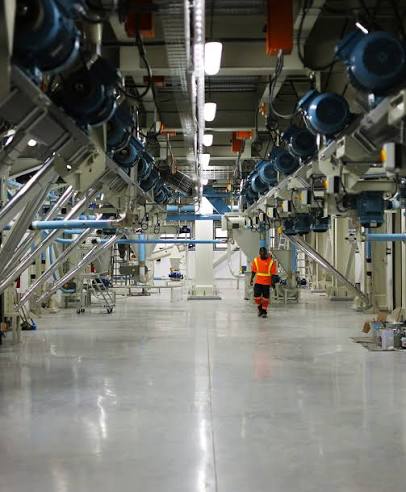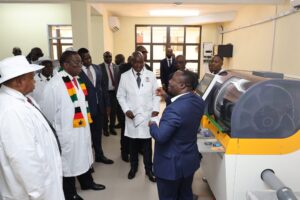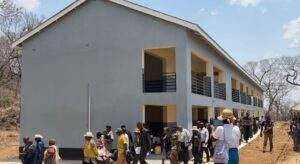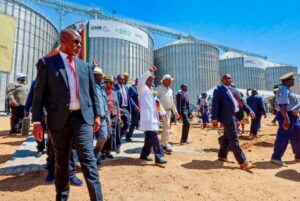Manicaland Gears Up for Commissioning of Major Development Projects During ZANU PF People’s Conference
5 min read
Mutare – As the 22nd ZANU PF National People’s Conference continues to draw attention in Mutare, the Ministry of Provincial Affairs and Devolution for Manicaland Province has officially announced the commissioning of key developmental projects that mark significant progress in the province’s ongoing devolution and infrastructure drive.
The commissioning ceremony, initially scheduled for Thursday, October 16, has now been moved to Saturday, October 18, 2025, according to an official circular issued by the Office of the Minister for Provincial Affairs and Devolution.
The ceremony will run from 1000 to 1300 hours and will encompass a series of activities that highlight the government’s focus on health infrastructure, environmental sustainability, and industrial empowerment.
The commissioning programme will commence at the newly established NatPharm Warehouse, proceed to a symbolic Tree Planting exercise at the ZANU PF stand, and culminate in the official commissioning of the Mega Market Milling Plant — the venue for the main ceremony.
These three activities symbolize Zimbabwe’s integrated vision of health, environment, and economic self-sufficiency under the Second Republic.
The inclusion of the NatPharm Warehouse in the programme underscores government’s commitment to improving healthcare delivery systems across provinces.
NatPharm (National Pharmaceutical Company of Zimbabwe) plays a crucial role in the procurement, storage, and distribution of essential medicines and medical supplies.
The commissioning of a warehouse in Manicaland is expected to strengthen the province’s healthcare infrastructure, ensuring timely access to drugs and medical equipment across district hospitals and clinics.
Health experts and local administrators have hailed this development as a step toward the realization of Vision 2030 goals, particularly in promoting equitable access to healthcare services.
With the province’s vast geography and often challenging terrain, local storage and distribution centers such as the new warehouse are seen as vital in enhancing responsiveness and efficiency within the health sector.
Following the warehouse visit, the programme will move to a Tree Planting ceremony at the ZANU PF stand.
This initiative is aligned with the government’s nationwide tree-planting and environmental restoration campaign, which promotes sustainable management of natural resources in response to climate change.
Environmental conservation has become a major theme in Zimbabwe’s development discourse, particularly in light of the devastating effects of deforestation and erratic rainfall patterns.
The symbolic planting of trees during the conference serves as a reminder of the importance of environmental stewardship and intergenerational responsibility.
Speaking ahead of the event, provincial officials emphasized that the exercise is not merely ceremonial but part of a broader effort to rehabilitate degraded ecosystems and enhance community awareness on sustainable land use.
The activity is expected to draw participation from youth groups, war veterans, and members of various ZANU PF wings as part of a collective gesture toward environmental renewal.
The highlight of the day will be the commissioning of the Mega Market Milling Plant, a major industrial facility positioned as a cornerstone in Manicaland’s drive toward local industrialization and food security.
The plant, which forms part of the province’s agro-processing and value addition strategy, is designed to process grain and other agricultural produce into finished products, creating jobs and stabilizing food supply chains in the process.
This investment in agro-industrial infrastructure reflects the government’s broader devolution thrust — empowering provinces to develop their own economic ecosystems.
The establishment of such facilities is consistent with President Emmerson Mnangagwa’s mantra, “Nyika inovakwa nevene vayo” (A country is built by its own people), emphasizing the need for communities to drive localized economic transformation.
The milling plant is expected to provide direct and indirect employment to hundreds of people, stimulate small-scale farming activities, and reduce dependence on imports for basic commodities.
Analysts predict that the commissioning will mark a new chapter in Manicaland’s economic trajectory, positioning the province as a key player in Zimbabwe’s grain and food processing industry.
Manicaland, being one of Zimbabwe’s most diverse and strategically located provinces, continues to benefit from various development initiatives under the Devolution and Infrastructure Development Fund.
These include road rehabilitation projects, modern market facilities, water reticulation systems, and new educational institutions.
The 22nd ZANU PF National People’s Conference, currently underway in Mutare, provides a fitting backdrop for the commissioning of these projects.
The conference has brought together thousands of delegates from across the country to deliberate on national policy, governance, and economic transformation under the Second Republic.
Themes emerging from this year’s conference — unity, productivity, and sustainable growth — align closely with the initiatives being launched across Manicaland.
The commissioning of projects during the conference serves both a symbolic and practical purpose: demonstrating that policy pronouncements are being translated into tangible results on the ground.
Delegates are expected to tour various development sites as part of the conference’s “Action and Results” theme, which places emphasis on measurable progress rather than rhetoric. In this regard, Manicaland stands out as an example of effective provincial coordination and project implementation.
The Office of the Minister for Provincial Affairs and Devolution has been instrumental in coordinating development activities in Manicaland, ensuring that local priorities are aligned with national development plans.
The commissioning of these projects showcases the success of Zimbabwe’s devolution model, which allocates fiscal and administrative authority to provinces to manage their own development agendas.
Under this framework, provincial governments are increasingly becoming centers of innovation, investment attraction, and public service delivery.
The Ministry’s proactive engagement with local authorities, the private sector, and community organizations has been widely credited for revitalizing the province’s economic outlook.
As Zimbabwe accelerates its march toward Vision 2030 — to become an upper-middle-income economy — the role of provincial structures such as Manicaland’s becomes ever more pivotal.
The projects to be commissioned this weekend are a testament to what can be achieved through collaboration, vision, and the efficient use of devolved resources.
Saturday’s commissioning ceremony will not only mark the official unveiling of key infrastructure in Manicaland but also reaffirm the government’s commitment to grassroots-driven national development.
The NatPharm Warehouse, Tree Planting initiative, and Mega Market Milling Plant collectively reflect a holistic vision of health, environment, and industry — pillars essential to sustainable growth.
As the ZANU PF People’s Conference continues in Mutare, the province stands as a living laboratory of the devolution success story — where policy meets practice and promises become progress.
The message is clear: development is not a distant dream but a work in progress, unfolding in the hands of the people of Manicaland and the leadership that continues to drive Zimbabwe forward.




